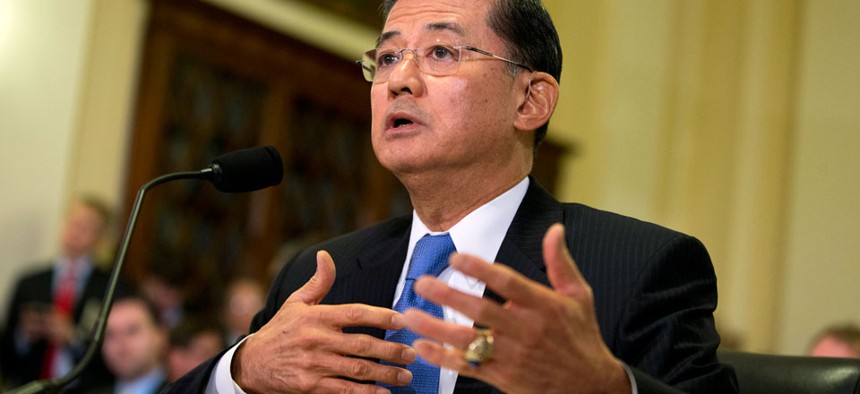VA Is Competing for the Pentagon’s Electronic Health Record Contract

Veterans Affairs Secretary Eric Shinseki Evan Vucci/AP
Shinseki will go up against commercial bidders.
The Veterans Affairs Department plans to enter its next generation electronic health record into the competition for the Defense Department’s EHR job, VA Secretary Eric Shinseki told a hearing of the House Veterans Affairs Committee Thursday.
VA plans to develop an advanced version of its Veterans Health Information Systems and Technology Architecture EHR dubbed VistA Evolution, Shinseki told the hearing. The new software will be equal to commercial software Defense plans to consider for its EHR, Shinseki said in response to a series of questions from Rep. David Roe, R-Tenn. “We want to be in competition for [the] DoD [EHR],” Shinseki said.
VA has released the open source MUMPS – or multi-user multi-programming system – code that powers VistA to commercial developers, another reason to believe there will be little difference between VA and commercial EHRs, Shinseki told the hearing.
Alternatively, if Defense develops a software module that meets VA needs, Shinseki said, VA “will go after that.”
In late February 2013, Elizabeth McGrath, then deputy chief management officer for Defense, told a House VA Committee hearing that the Pentagon would conduct an analysis of VistA and commercial systems for its next generation EHR. Last month the Pentagon asked interested vendors to provide insight on possible licensing models for its EHR.
Earlier in February 2013, VA and Defense all but abandoned plans to develop a joint EHR when costs of the project spiraled to $28 billion.
VA requested a budget of $269 million for VistA Evolution in 2015, down $21 million from $290 million in 2014. Stephen Warren, the VA executive in charge of information and technology, said 75 percent of the 2014 VistA Evolution budget is frozen until the department provides Congress with a report detailing interoperability between the Defense and VA EHRs within the next 30 days.
The American Legion, in written testimony submitted at the hearing, said Defense and VA have "already squandered more than a billion dollars of taxpayer money and wasted years in an ultimately empty pursuit of a joint electronic medical record system that would have streamlined and simplified logistics between the two agencies.”
The Legion pointed out the obvious: “The warfighter turned veteran is the same patient and deserves a system that honors that person with continuous care and seamless transition between agencies. It is unforgivable that DoD and VA have spent the past several years infighting rather than actively developing a comprehensive solution that is in the best interest of the American service member.”
A frustrated Roe told Shinseki he wanted to see action on interoperable VA and Defense EHRs and "did not want to be having this conversation in another ten years.”
Get the Nextgov iPhone app to keep up with government technology news.



